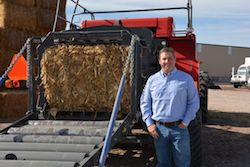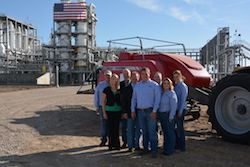 Last week Abengoa’s cellulosic ethanol biorefinery went online and is expected to produce 25 million gallons of advanced ethanol per year as well as 21 MW of bioenergy. But how exactly does the corn and wheat residue get from the fields to the biorefinery in a economical and efficient way? Enter Pacific Ag.
Last week Abengoa’s cellulosic ethanol biorefinery went online and is expected to produce 25 million gallons of advanced ethanol per year as well as 21 MW of bioenergy. But how exactly does the corn and wheat residue get from the fields to the biorefinery in a economical and efficient way? Enter Pacific Ag.
The company was founded by Bill Levy in 1998 and began by baling residue for growers and using the biomass for animal feed both in the U.S. and internationally. It was a natural progression for Pacific Ag to get involved in cellulosic production in the U.S. and to become a major supplier to the industry.
I asked Levy to talk about their residue removal model. He noted that since their inception, they have always focused on having a balanced residue program for growers and they are finding value for those products for them. So taking their successful model from the Northwest and applying it to the Midwest was a good fit. “The fundamentals of having residue removed on a timely basis and in a sustainable way is really the same,” explained Levy. Today they are in California, North Carolina, Iowa, Kansas and he says they have innovated to become “energy balers” because of the new bioenergy market for residue.
There has been talk about the best biomass model for the biofuels industry. I posed this question to Levy and he explained how they have refined their model to be financial feasible. “We have tried to make it easy for growers to be part of the program by taking care of the harvest, we own the machinery, we schedule the harvest or the removal of the residue, or energy crop with the grower and then we provide them with an income stream for that product,” Levy answer ed. “It’s very important that we have the size that allows us to invest in that equipment and a lot of times it doesn’t make sense financially for a grower to to invest in that harvest equipment just to harvest the residue.” Pacific Ag is the largest purchaser and owner of baling equipment in the world.
ed. “It’s very important that we have the size that allows us to invest in that equipment and a lot of times it doesn’t make sense financially for a grower to to invest in that harvest equipment just to harvest the residue.” Pacific Ag is the largest purchaser and owner of baling equipment in the world.
“So what growers enjoy is being able to sit back and enjoy a residue removal program and the income from that but not have to put a lot of effort into it,” added Levy.
Pacific Ag is looking for growers of rice, wheat, corn and other biomass crops who are interested in working with them. As cellulosic ethanol plants including Abengoa continue to ramp up to nameplate capacity, more biomass will be needed and Pacific Ag is ready to be the advanced biofuels partner to help make the cellulosic industry and the growers who plant the bioenergy crops, successful.
Learn more about Pacific Ag and how to become involved in the biomass energy revolution by listening to my interview with Bill Levy: Interview with Bill Levy, Pacific Ag

